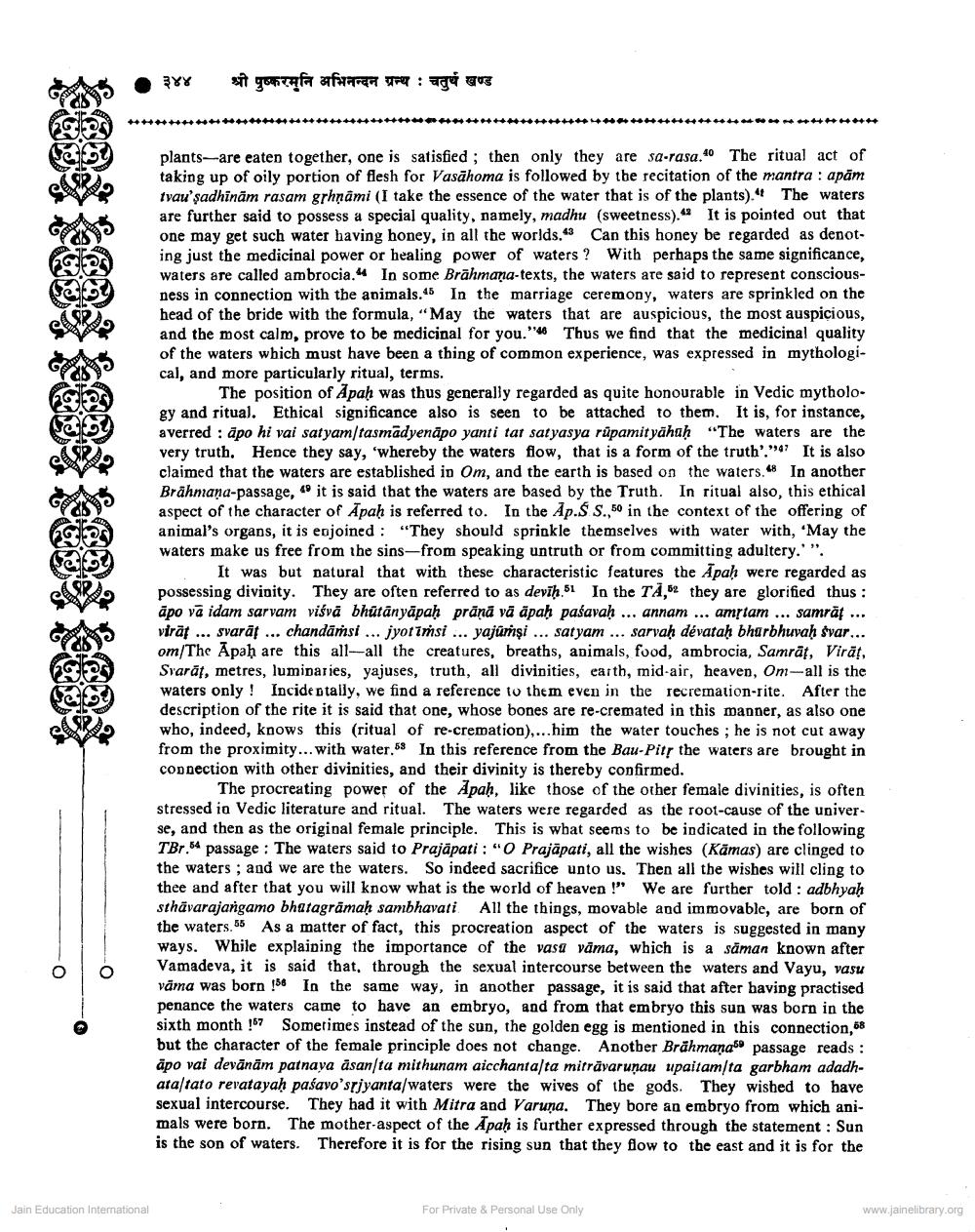________________
३४४
श्री पुष्करमुनि अभिनन्दन ग्रन्थ : चतुर्थ खण्ड
plants are eaten together, one is satisfied; then only they are sa-rasa.40 The ritual act of taking up of oily portion of flesh for Vasāhoma is followed by the recitation of the mantra : apām tvau'sadhinām rasam grhnami (I take the essence of the water that is of the plants). The waters are further said to possess a special quality, namely, madhu (sweetness). It is pointed out that one may get such water having honey, in all the worlds.43 Can this honey be regarded as denoting just the medicinal power or healing power of waters? With perhaps the same significance, waters are called ambrocia. In some Brāhmana-texts, the waters are said to represent consciousness in connection with the animals. In the marriage ceremony, waters are sprinkled on the head of the bride with the formula, “May the waters that are auspicious, the most auspicious, and the most calm, prove to be medicinal for you."*46 Thus we find that the medicinal quality of the waters which must have been a thing of common experience, was expressed in mythological, and more particularly ritual, terms.
The position of Apah was thus generally regarded as quite honourable in Vedic mytholo. gy and ritual. Ethical significance also is seen to be attached to them. It is, for instance, averred : āpo hi vai satyam/tasmadyenäpo yanti tat satyasya rüpamityähah "The waters are the very truth. Hence they say, 'whereby the waters flow, that is a form of the truth'."47 It is also claimed that the waters are established in Om, and the earth is based on the waters. In another Brāhmana-passage, it is said that the waters are based by the Truth. In ritual also, this ethical aspect of the character of Āpah is referred to. In the Ap.S S.,50 in the context of the offering of animal's organs, it is enjoined: "They should sprinkle themselves with water with, 'May the waters make us free from the sins-from speaking untruth or from committing adultery.'".
It was but natural that with these characteristic features the Apah were regarded as possessing divinity. They are often referred to as devih.51 In the TĂ,62 they are glorified thus : āpo va idam sarvam visvä bhūtānyāpaḥ prānā vā āpah paśavah ... annam ... amptam ... samrāt ... virat ... svarāt ... chandāṁsi ... jyotissi ... yajúşi ... satyam ... sarvaḥ dévatah bharbhuvaḥ svar... om/The Apaḥ are this all-all the creatures, breaths, animals, food, ambrocia, Samrāt, Virāt, Svarāj, metres, luminaries, yajuses, truth, all divinities, earth, mid-air, heaven, On--all is the waters only! Incidentally, we find a reference to them even in the recremation-rite. After the description of the rite it is said that one, whose bones are re-cremated in this manner, as also one who, indeed, knows this (ritual of re-cremation),...him the water touches ; he is not cut away from the proximity... with water.58 In this reference from the Bau-Pits the waters are brought in connection with other divinities, and their divinity is thereby confirmed.
The procreating power of the Apah, like those of the other female divinities, is often stressed in Vedic literature and ritual. The waters were regarded as the root cause of the universe, and then as the original female principle. This is what seems to be indicated in the following TBr. 54 passage : The waters said to Prajāpati : "O Prajāpati, all the wishes (Kāmas) are clinged to the waters, and we are the waters. So indeed sacrifice unto us. Then all the wishes will cling to thee and after that you will know what is the world of heaven !" We are further told : adbhyah sthāvarajargamo bhatagrāmah sambhavati All the things, movable and immovable, are born of the waters. As a matter of fact, this procreation aspect of the waters is suggested in many ways. While explaining the importance of the vasa vama, which is a saman known after Vamadeva, it is said that, through the sexual intercourse between the waters and Vayu, vasu väma was born 156 In the same way, in another passage, it is said that after having practised penance the waters came to have an embryo, and from that embryo this sun was born in the sixth month !57 Sometimes instead of the sun, the golden egg is mentioned in this connection, 68 but the character of the female principle does not change. Another Brāhmana passage reads : apo vai devānām patnaya asanta mithunam aicchanta/ta miträvarunau upaitam/ta garbham adadhata/tato revatayah pasayo'sriyanta/waters were the wives of the gods. They wished to have sexual intercourse. They had it with Mitra and Varuna. They bore an embryo from which animals were born. The mother aspect of the Apah is further expressed through the statement : Sun is the son of waters. Therefore it is for the rising sun that they flow to the east and it is for the
Jain Education International
For Private & Personal Use Only
www.jainelibrary.org




